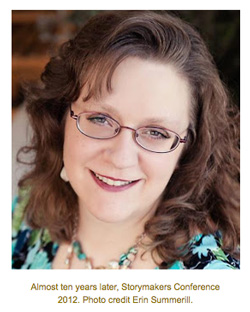Back when I was first published (yes, check out the picture of me … little baby author Tristi) I had one main goal.
You see, when I got my contract, a friend of my mother’s said to me, “I hope you don’t change now that you’re going to be published. An author lives in our ward, and as soon as she got published, she became totally different. She won’t give us the time of day anymore.”
Other people said pretty much the same thing. “I hope that when you’re rich and famous, you’ll still have time for us.” “Well, it was nice knowing you.” “You’ll be different now, I guess.”
These comments all really bothered me. Why would getting a publishing contract mean that I would change? Why couldn’t I be a published author and still be myself—wasn’t there a way to be both? And so I set a goal, the main goal I mentioned in the first paragraph: I was not going to change. I would always be me.
My plan seemed to work. No matter how many book signings I did or classes I presented or book clubs I did, I was careful that I was always myself. I never put on any airs or acted stuck up or pretended to know stuff I didn’t know. I didn’t name-drop … even though I actually know some really amazing, highly famous people … and I tried to stay pretty low-key about some of the awesome experiences I had. I didn’t want people to look at me and say, “She’s changed. She got published and now she’s a totally different person.” I was going to fight that tooth and nail.
But then I realized something. I had changed.
I was more confident.
I was more educated.
I was more outgoing.
I was finding new talents to share.
I was becoming an expert in my field.
I was funnier.
I was more popular.
I was learning how to respect myself more.
I was making money. (Not a lot, but some. Still working on that.)
I was sought after.
I was viewed as a mentor.
I was stronger mentally, emotionally, and spiritually.
Oh, no. I broke my promise … I had promised not to change, and then I went and did it.
 When I look at who I was back then and who I am today, I can’t say that I regret breaking that promise. The fundamentals of who I am have not changed. I’m still friendly and approachable and helpful and as cute as a button, but I’m also wiser and stronger and more able to hold my own. I have learned so much, and everything I’ve learned has shaped me. I’m a far, far better person than I was ten years ago.
When I look at who I was back then and who I am today, I can’t say that I regret breaking that promise. The fundamentals of who I am have not changed. I’m still friendly and approachable and helpful and as cute as a button, but I’m also wiser and stronger and more able to hold my own. I have learned so much, and everything I’ve learned has shaped me. I’m a far, far better person than I was ten years ago.
And have I lost friends along the way? I’m sorry to say that I have. Some didn’t realize that I wasn’t going to dump them and they dumped me first, thinking they’d take it upon themselves. And some, even though I rarely even mentioned my writing, felt that I talked about it too much and thought I was bragging. What I’ve come to realize is this—the people who said “Don’t change” were really saying “Don’t leave us behind. Um, no, we aren’t going to pursue our own dreams—that’s too hard—so you stay back here with us so we can be more comfortable.”
I don’t like to think about the relationships that were left behind—it makes me sad. But a real friendship, a real relationship, doesn’t punish you for growing as a person, and I learned that the hard way.
Being an author does change you, whether you want it to or not. Every experience you have in life should change you—that’s what life is for. If your life isn’t changing you, you aren’t living it right. We should not leave this planet the same people we were as when we stepped on it. We should be stronger. We should be smarter. We should be more compassionate, more aware, more giving.
I like who I am now. I know I’m not everyone’s cup of tea—a little Tristi goes a long way—but I’m proud of the progress I’ve made. I still have a lot to do—weaknesses I want to turn into strengths, character flaws I’m not too crazy about—and, unfortunately, I know that growth will hurt. That’s just part of it. But what it all boils down to is this—I’ve changed. I’ve changed for the better, for the smarter, for the wiser, and no one should ask you to stay the same either.
Experiences that don’t change you aren’t worth having.
Tristi Pinkston is the author of seventeen (and counting!) published books, including the Secret Sisters mystery series. In addition to being a prolific author, Tristi also provides a variety of author services, including editing and online writing instruction. You can visit her at www.tristipinkston.blogspot.com or her website at www.tristipinkston.com.